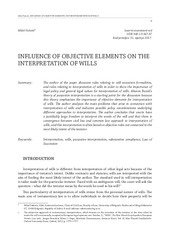Influence of objective elements on the interpretation of wills
Апстракт
The author of the paper discusses rules relating to will execution formalities, and rules relating to interpretation of wills in order to show the importance of legal policy and general legal values for interpretation of wills. Aharon Barak's theory of purposive interpretation is a starting point for the discussion because this theory emphasizes the importance of objective elements for interpretation of wills. The author analyses the main problems that arise in connection with interpretation of wills and indicates possible policy considerations underlying different approaches to interpretation. The author concludes that courts have a justifiably large freedom to interpret the words of the will and that there is convergence between civil law and common law approach to interpretation of wills, and this interpretation is often based on objective rules not connected to the most likely intent of the testator.
Кључне речи:
wills / substantive compliance / purposive interpretation / Law of Succession / InterpretationИзвор:
Pravni vjesnik, 2017, 33, 1, 9-29Издавач:
- Pravni Fakultet Sveucilista Josipa Jurja Strossmayera & Osijeku, Osijek
Институција/група
Pravni fakultet / Faculty of Law University of BelgradeTY - JOUR AU - Vukotić, Miloš PY - 2017 UR - https://ralf.ius.bg.ac.rs/handle/123456789/944 AB - The author of the paper discusses rules relating to will execution formalities, and rules relating to interpretation of wills in order to show the importance of legal policy and general legal values for interpretation of wills. Aharon Barak's theory of purposive interpretation is a starting point for the discussion because this theory emphasizes the importance of objective elements for interpretation of wills. The author analyses the main problems that arise in connection with interpretation of wills and indicates possible policy considerations underlying different approaches to interpretation. The author concludes that courts have a justifiably large freedom to interpret the words of the will and that there is convergence between civil law and common law approach to interpretation of wills, and this interpretation is often based on objective rules not connected to the most likely intent of the testator. PB - Pravni Fakultet Sveucilista Josipa Jurja Strossmayera & Osijeku, Osijek T2 - Pravni vjesnik T1 - Influence of objective elements on the interpretation of wills EP - 29 IS - 1 SP - 9 VL - 33 DO - 10.25234/pv/4943 UR - conv_3039 ER -
@article{
author = "Vukotić, Miloš",
year = "2017",
abstract = "The author of the paper discusses rules relating to will execution formalities, and rules relating to interpretation of wills in order to show the importance of legal policy and general legal values for interpretation of wills. Aharon Barak's theory of purposive interpretation is a starting point for the discussion because this theory emphasizes the importance of objective elements for interpretation of wills. The author analyses the main problems that arise in connection with interpretation of wills and indicates possible policy considerations underlying different approaches to interpretation. The author concludes that courts have a justifiably large freedom to interpret the words of the will and that there is convergence between civil law and common law approach to interpretation of wills, and this interpretation is often based on objective rules not connected to the most likely intent of the testator.",
publisher = "Pravni Fakultet Sveucilista Josipa Jurja Strossmayera & Osijeku, Osijek",
journal = "Pravni vjesnik",
title = "Influence of objective elements on the interpretation of wills",
pages = "29-9",
number = "1",
volume = "33",
doi = "10.25234/pv/4943",
url = "conv_3039"
}
Vukotić, M.. (2017). Influence of objective elements on the interpretation of wills. in Pravni vjesnik Pravni Fakultet Sveucilista Josipa Jurja Strossmayera & Osijeku, Osijek., 33(1), 9-29. https://doi.org/10.25234/pv/4943 conv_3039
Vukotić M. Influence of objective elements on the interpretation of wills. in Pravni vjesnik. 2017;33(1):9-29. doi:10.25234/pv/4943 conv_3039 .
Vukotić, Miloš, "Influence of objective elements on the interpretation of wills" in Pravni vjesnik, 33, no. 1 (2017):9-29, https://doi.org/10.25234/pv/4943 ., conv_3039 .




